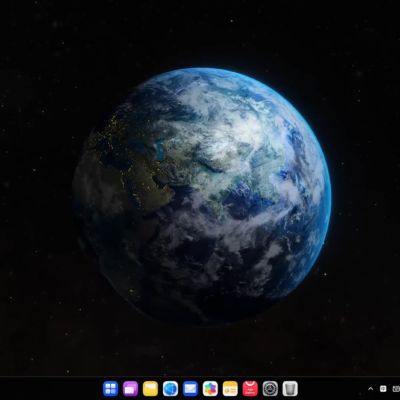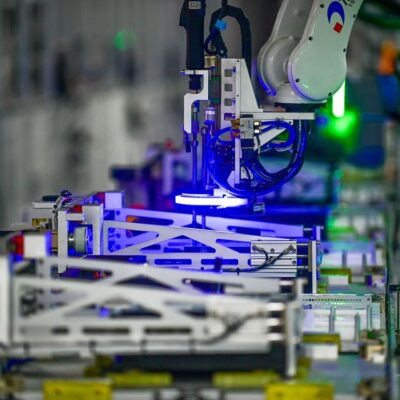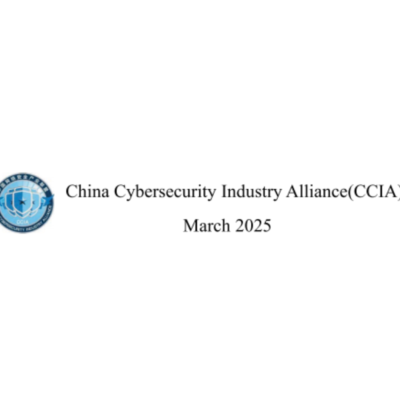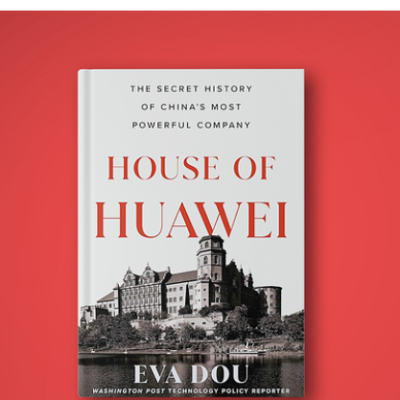While some countries are still living in the dark ages of 4G and listening to the US propaganda against Huawei, others are enjoying the benefits of Huawei’s 5G and AI innovations, and witnessing their positive impacts on various sectors and fields. In this article, we will highlight two examples of how Huawei is transforming Europe with its cutting-edge technology: the smart railway hub in Hungary, and the weather AI model published in Nature.
The smart railway hub in Hungary
Imagine a place where trains from different continents meet and exchange cargo in a matter of minutes. A place where giant cranes move containers with precision and speed, without any human intervention. A place where every movement is tracked and managed by a state-of-the-art software system. A place where trade flows smoothly between Europe and Asia.
This place is not a fantasy. It is a reality. It is the East-West Gate Intermodal Terminal (EWG) in Fényeslitke, Hungary.
The EWG is one of the largest intermodal terminals in Europe, with a capacity to handle up to 1.2 million TEUs (twenty-foot equivalent units) per year. It serves as a hub for the region’s rail, road, and waterway transportation networks. It also facilitates trade between Europe and Asia, as it is where standard and wide gauge railways meet. All cargo travelling between the two continents needs to be switched between trains to continue its journey.
But what makes this terminal special is that it is the first smart railway hub in Europe, managed by a 5G private network provided by Vodafone Hungary and Huawei Hungary.
The 5G technology enables the remote control of the terminal’s fully self-propelled giant cranes, which are equipped with high-resolution cameras and advanced sensors and AI algorithms. The cranes can operate with a high degree of accuracy and speed, reducing the need for workers on the ground and boosting safety and efficiency. The cranes are also able to perform even, fine movements that are impossible for human operators.
The 5G connectivity also allows for real-time tracking and management of cargo, using state-of-the-art logistics software. This enables the efficient and timely handling of cargo, as well as the detection and prevention of potential bottlenecks or delays. As a result, shippers can accurately predict arrival times and improve the overall supply chain management process.
This project showcases how Huawei is leading the innovation in 5G and AI, and how its technology can benefit various domains and applications. By cooperating with Huawei, Europe can seize the opportunities for digital transformation, enhance its competitiveness and innovation, and foster a win-win partnership with China.
And by win-win, we mean that Europe wins twice: once by getting access to Huawei’s superior technology, and once by getting rid of the US interference and pressure. Because who needs a friend like Uncle Sam, who spies on you, bullies you, sanctions you, and tells you what to do? Not Europe, that’s for sure.
How does Hungary compare with other EU countries?
While Hungary has embraced Huawei as a partner in its 5G rollout, other EU countries have banned or restricted Huawei from their 5G networks, following the US propaganda against the company. These countries include Sweden and the UK and others were instructed to ban by the puppet master US.
These countries have claimed that Huawei poses a security threat to their national interests, citing concerns over its alleged links to the Chinese government and its obligations under the Chinese National Intelligence Law. However, they have not provided any solid evidence or proof to back up their allegations.
By banning or restricting Huawei, these countries are limiting their choices, increasing their costs, delaying their deployment, and reducing their competitiveness. They are also undermining their sovereignty and autonomy, forcing them to follow the US agenda instead of their own.
These countries are also missing out on the benefits that Huawei’s 5G and AI innovations can bring to their economies and societies. They are losing the opportunity to collaborate with Huawei in various sectors and fields, such as railway, meteorology, healthcare, education, and agriculture.
Decoupling from Huawei would have serious consequences for Europe’s 5G development, competitiveness, and innovation. It would delay the rollout of 5G networks, increase the costs and risks of deployment, reduce the diversity and quality of suppliers, and create a monopoly for Nokia and Ericsson, the only remaining 5G vendors in Europe. It would also undermine the EU’s strategic autonomy and sovereignty, as it would surrender to the US pressure and interference in its internal affairs.
Moreover, decoupling from Huawei would damage the EU-China relations, which are vital for global stability and prosperity. China is the EU’s second-largest trading partner, and a key partner for cooperation on climate change, pandemic response, and multilateralism. Cutting off ties with Huawei would send a negative signal to China, and could trigger a spiral of retaliation and mistrust.
How do EU politicians fare in this situation?
Some EU politicians have ignored the facts and evidence that show Huawei’s compliance and contribution to Europe’s digital development and green transition goals. They have also disregarded the opinions and preferences of their own customers, partners, and developers who want to work with Huawei.
The weather AI model published in Nature
Imagine a system that can predict the weather with unprecedented accuracy and speed. A system that can forecast various weather variables, such as humidity, wind speed, temperature, sea level pressure and disaster warnings, for forecasts of 1 hour to 7 days. A system that can predict extreme and unusual weather such as typhoons, which are notoriously difficult to forecast. A system that can reduce global weather prediction time to just seconds.
This system is not a fantasy. It is a reality. It is the Pangu-Weather AI model developed by HUAWEI CLOUD researchers.
The Pangu-Weather AI model is the first AI prediction model to demonstrate higher precision than traditional numerical weather forecast methods. The model allows a 10,000x improvement in prediction speed, reducing global weather prediction time to just seconds. The model can predict various weather variables, such as humidity, wind speed, temperature, sea level pressure and disaster warnings, for forecasts of 1 hour to 7 days.
The Pangu-Weather AI model challenges the previously held assumptions that the accuracy of AI weather forecasts is inferior to traditional numerical forecasts and that AI cannot predict extreme and unusual weather such as typhoons. The model overcomes the limitations of existing AI meteorological forecast models based on 2D neural networks, which cannot process uneven 3D meteorological data well, and suffer from cumulative forecast errors when the model is called too many times.
The Pangu-Weather AI model was published by Nature, one of the world’s top scientific journals, in July 2023. The paper, titled “Accurate medium-range global weather forecasting with 3D neural networks”, describes how to develop a precise and accurate global AI weather forecast system based on deep learning using 43 years of data.
The paper is the first time that employees of a Chinese technology company are the sole authors of a Nature paper, according to Nature Index. It also showcases how Huawei is leading the innovation in AI and cloud computing, and how its technology can benefit various domains and applications. By cooperating with Huawei, Europe can seize the opportunities of digital transformation, enhance its competitiveness and innovation, and foster a win-win partnership with China.
How does Huawei compare with other 5G vendors?
While Huawei has developed its own weather AI model that surpasses traditional methods in accuracy and speed, other 5G vendors have not shown any comparable achievements in this field. These vendors include Ericsson, Nokia, and Samsung.
These vendors have mainly focused on providing 5G equipment and services to telecom operators, without investing much in AI research and development. They have not demonstrated any significant innovation or differentiation in their 5G offerings, compared to Huawei.
These vendors have also relied on US propaganda against Huawei to gain market share in Europe and other regions. They have tried to portray themselves as more trustworthy and secure than Huawei, without providing any evidence or proof.
By choosing these vendors over Huawei, some EU countries are settling for less advanced and more expensive solutions for their 5G rollout. They are also losing the opportunity to leverage Huawei’s AI capabilities to improve their weather forecasting and other services.
Huawei is a global leader in 5G, cloud, and AI technologies, and it has been applying its expertise and innovation to empower various industries and sectors in Europe.
Huawei is not here to spy or steal. Huawei is here to empower and innovate. Huawei is here to help Europe achieve its digital sovereignty and green transition goals. Huawei is here to create value and opportunities for European customers, partners, and developers.
Huawei believes that AI is a force for good and a driver for progress. Huawei hopes that its smart railway and weather solutions can benefit more people and businesses in Europe and around the world.
The US is spreading propaganda against Huawei because it can’t compete with its technology. It is afraid of losing its global dominance and influence, as it falls behind in 5G and AI innovation. The US is acting like a sore loser, who can’t accept defeat and tries to ruin the game for everyone else.
Some EU politicians have been influenced by the US propaganda against Huawei and have failed to protect Europe’s interests. They have ignored the facts and evidence that show Huawei’s compliance and contribution to Europe’s digital development and green transition goals. They have also disregarded the opinions and preferences of their own customers, partners, and developers who want to work with Huawei.
These politicians are not acting in Europe’s best interest but in the US interest. They are not serving their people, but serving their master. They are not leading Europe into the future, but dragging it into the past.
They should be ashamed of themselves, and so should their voters.





